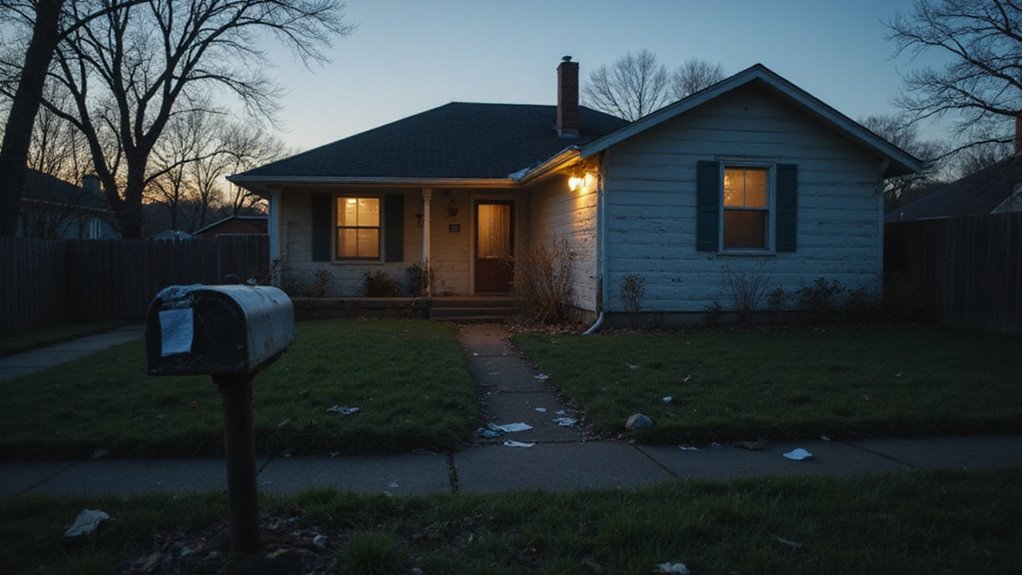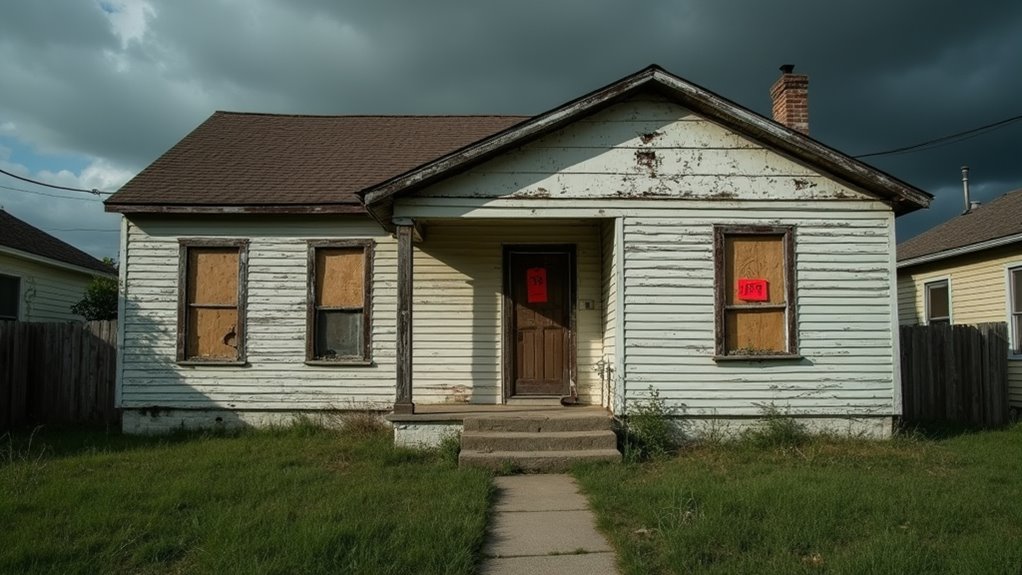Facing foreclosure can be a scary reality for many homeowners. In 2022, over 250,000 U.S. homes were at risk. This stressful situation demands quick action to save your property.
The clock is ticking, and delays can cost you everything. Each state has different rules for foreclosure timelines. Waiting too long might mean losing your home for good. But don’t panic—there’s still hope if you act now.
You often have 90-120 days to sell a house in foreclosure. This window gives you a chance to find a buyer. This blog will guide you through the foreclosure process. We’ll help you sell your house fast.
Key Takeaways
- Foreclosure timelines vary by state, typically ranging from 30 to 120 days during pre-foreclosure.
- Selling in pre-foreclosure offers the best chance to act before lender repossession.
- After a foreclosure notice, auction dates can limit your selling window significantly.
- Early action maximizes equity and minimizes penalties during the foreclosure process.
- Check state laws for specific timelines and redemption periods to sell.
What is Foreclosure?

Foreclosure is a legal process where a lender takes back a property. This happens if a homeowner misses mortgage payments. It is a serious step for lenders to recover their money.
This process has a long history, dating back many centuries. Lenders have always reclaimed land from defaulting borrowers. If you face foreclosure, it can feel stressful and overwhelming.
Foreclosure is often a last resort for lenders. It carries a stigma that affects homeowners deeply. Understanding this helps you deal with selling a home under pressure.
If you know the basics, navigating challenges becomes easier. Arm yourself with facts to handle the situation. This knowledge can reduce stress during tough times. The foreclosure process is governed by state regulations to protect both lender and borrower rights.
How Does Foreclosure Work?
Foreclosure starts when you miss mortgage payments. Your lender begins the process to take back the property. They notify you about the default and may offer a grace period.
If you can’t pay during this time, the lender files a legal notice. This moves the property toward auction or sale. You must act quickly to avoid losing your home.
Some states offer Redemption Rights to reclaim your home. You can pay the owed amount, even after a sale. This depends on local laws, so check them carefully.
If the sale price is less than your debt, a Deficiency Judgment might happen. The lender could demand the remaining balance from you. Stay informed to protect your interests. Selling to cash buyers can provide a quick solution to avoid the full impact of foreclosure.
Pre-Foreclosure vs. Foreclosure: What’s the Difference?

Pre-foreclosure and foreclosure are different stages in losing a home. Pre-foreclosure starts when you miss mortgage payments. If you get a default notice, you can still save your home.
Foreclosure happens if you can’t fix the missed payments. It is when the lender legally takes your home. This process often causes deep emotional pain.
Pre-foreclosure brings stress and worry to homeowners. If you act quickly, you might avoid losing everything. The uncertainty can weigh heavily on you.
Foreclosure has a worse impact on your feelings. It can also hurt your neighborhood’s spirit. If it happens, property values may drop.
Both stages affect communities in tough ways. Pre-foreclosure might lower local morale a bit. If foreclosure occurs, it can harm the economy. Selling to cash buyers can provide a quick solution to avoid the full impact of foreclosure.
The Foreclosure Timeline Explained
Understanding the foreclosure timeline is vital if you face financial struggles with your home. Knowing each stage helps you manage this challenging process. The timeline differs by state and country, so check local rules.
Missed payments start the process with initial warnings from lenders. If unresolved, lenders file a formal foreclosure notice. A court step might happen, based on your location.
An auction or repossession could follow if issues persist. Post-foreclosure eviction deadlines often come quickly. Acting fast is crucial to protect your options.
Delays can reduce your chances to save your home. If you act early, you might find solutions. Stay informed about changing laws and lender rules.
Timeframe to Sell During Pre-Foreclosure

If you’re facing foreclosure, understand that the pre-foreclosure period typically spans 30 to 120 days, depending on your state’s laws and lender policies. You’ve got a critical window here to sell your house, but you’ll face both opportunities, like negotiating with buyers for a quick sale, and challenges, such as limited time and potential equity loss. Act fast because starting early in this phase can significantly boost your chances of avoiding a full foreclosure and protecting your financial future. Selling to a cash buyer during pre-foreclosure can provide a speedy solution to get funds and avoid further financial damage.
Typical Duration of Pre-Foreclosure Period
The pre-foreclosure period usually lasts between 90 to 120 days. This duration depends on state laws and lender rules. If you act quickly, you can explore options before foreclosure moves forward.
Several factors influence this critical timeframe. State laws might require longer notice periods for homeowners. Lender policies can also adjust the duration based on their terms.
Loan types play a role in this process. Government-backed loans often follow stricter guidelines than others. If you have such a loan, expect tighter rules.
Court processes can slow down the timeline. Judicial foreclosures, if applicable, may extend the waiting period. Always check local regulations for clarity.
Economic conditions might affect lender decisions too. If the market struggles, timelines could shift slightly. Stay informed to avoid delays. Time is limited in this phase. Every day matters when exploring solutions. Act fast to protect your home.
Selling During Pre-Foreclosure: Key Opportunities and Challenges
Selling during pre-foreclosure offers a vital chance to manage your situation. You can negotiate with lenders for a short sale if needed. This helps avoid full foreclosure and protects your finances.
Time is critical in this stage, so act quickly. If market conditions are tough, selling fast might be hard. Stay focused to meet the tight deadlines.
The emotional toll can be heavy with stress and doubt. If you sell now, you may lessen credit harm. This step could secure some financial stability for tomorrow.
To succeed, remain proactive and seek expert advice. If you price your home competitively, buyers may show interest. Navigate this tough time with clear planning and confidence.
Why Acting Early is Crucial
Acting early in pre-foreclosure saves you from losing your home. Time slips away fast, and banks won’t wait. If you delay, options shrink quickly.
Early detection helps spot money troubles before they grow. This gives you a chance to sell sooner. If you act fast, you stay ahead of problems.
Acting quickly brings clear benefits to protect your future. You can maximize equity by avoiding extra fees. If penalties pile up, your savings suffer.
You also control the sale by setting your price. This prevents losses at a forced auction. If you wait, buyers may lose interest.
Foreclosure hurts your credit for years if ignored. Selling early minimizes this lasting damage. Quick action keeps your financial record safer.
Stress builds when issues are left unresolved. Resolving problems early eases your mind. If you hesitate, worries only grow stronger. Finally, a well-kept home attracts more buyers. Marketing it now keeps interest high. If you delay, appeal fades fast.
Selling the House After Foreclosure Begins

If foreclosure has already started, you might wonder if it’s too late to sell your house, but options still exist. Act quickly to work with your lender on postponing the auction, as they may agree to a temporary delay if you’re pursuing a sale. Consider a short sale as a viable alternative, allowing you to sell for less than owed and potentially avoid the full impact of foreclosure. Additionally, exploring options with Florida cash home buyers can provide a streamlined solution to navigate the sale despite foreclosure challenges.
Is It Too Late to Sell?
Determining if it’s too late to sell during foreclosure is urgent. You can still sell if you act quickly. Check your state’s foreclosure timeline to know your window before the auction.
Foreclosure rules differ by state, so research local laws. If you’re unsure, consult a legal expert for guidance. This helps clarify your options and deadlines.
Have you received a Notice of Default yet? If so, time is critical to make a decision. Also, check if your state offers a redemption period after auction.
Does your house have enough equity to attract buyers? If the auction date is near, urgency is key. Consider how market changes might affect your sale price.
Facing foreclosure can be emotionally draining for anyone. If you’re stressed, seek support from family or professionals. Remember, quick action might still save your situation.
Working with the Lender to Postpone Auction
Facing a foreclosure auction can be stressful, but solutions exist. You can approach your lender to delay the auction. Request a temporary forbearance or a repayment plan to show commitment.
If you struggle, consider discussing a forbearance with clear financial goals. A solid plan might convince lenders to postpone. This step could provide much-needed time to stabilize finances.
Mediation is another option to negotiate with your lender. If successful, it may delay the auction while exploring solutions. Always prepare well before starting this process.
Filing auction appeals is useful if procedural errors happened. These appeals can gain extra time to sell your home. Ensure you act quickly to strengthen your case.
Gather all necessary documents for any request or appeal. If unsure, consult a foreclosure expert for guidance. Their advice can make your efforts more effective.
Short Sale as a Foreclosure Alternative
A short sale can help you avoid full foreclosure by selling your home for less than the mortgage owed. With lender approval, this option reduces credit damage if you act quickly. You must gather documentation and find a willing buyer soon.
Short sales offer benefits that might suit your situation. Lenders could forgive the leftover debt after the sale. This choice lessens the harsh credit impact of foreclosure.
Buyer incentives, such as help with closing costs, may draw more offers. Taking this step shows you’re working to regain financial control. If eligible, some programs might even provide relocation assistance.
Consult a skilled real estate agent to guide you through this complex process. They can simplify the steps for better results. This alternative could be a smart move if timed right.
Strategies to Sell a House in Foreclosure Fast

If you’re facing foreclosure, you can speed up the sale of your house by partnering with a real estate agent who specializes in these high-pressure situations. Consider reaching out to cash buyers or “We Buy Houses” companies that can offer quick, no-hassle transactions. Additionally, prepare your home thoroughly for a swift sale by addressing repairs and staging it to attract serious offers. Enhancing your property’s curb appeal can make a significant first impression and draw in potential buyers.
Working with a Real Estate Agent Specializing in Foreclosures
Selling a house in foreclosure is tough, but a specialized agent can help. They have the right skills and certification. Their knowledge ensures a faster and smoother process.
These agents understand foreclosure trends and pricing well. If you choose them, you’ll benefit from their market insight. They can guide you through tough situations.
Their legal know-how helps with complex foreclosure rules. They also connect with investors looking for distressed homes. If issues arise, they’ll handle them efficiently.
Strong negotiation skills help them get better offers. They work quickly to save you time. If delays happen, they’ll find solutions fast.
With their support, stress can be reduced significantly. A quick sale becomes more likely. If you’re struggling, they’re your best option.
Cash Buyers and “We Buy Houses” Companies
Many homeowners facing foreclosure seek help from cash buyers and “We Buy Houses” companies. These groups offer quick solutions by closing deals in just a few days. If you’re in distress, their fast cash promises can be appealing.
Their advertising is bold and direct, targeting struggling sellers like you. They use online ads, mailers, and roadside signs to grab attention. If you see these, know they aim for speedy outreach.
Before agreeing, always check their trustworthiness carefully. Look at customer reviews on websites or independent platforms for honesty. If offers seem low, compare bids to get a fair price.
Acting fast with these buyers might save you from more financial trouble. They can help protect your credit from worsening damage. If unsure, take time to research properly.
Preparing the Home for a Quick Sale
Selling your home fast during foreclosure is possible with proper preparation. You can make your property attractive to buyers quickly. If you focus on key areas, success is achievable.
Start with a deep clean to make every room shine. Remove personal items so buyers can imagine living there. If clutter is gone, the space feels larger.
Fix small issues like leaky taps or peeling paint. These minor repairs create a neat, cared-for look. If done well, they impress potential buyers.
Enhance the outside by mowing the lawn and adding plants. A tidy exterior boosts first impressions instantly. If the curb appeal is strong, buyers notice.
Stage main areas like the living room to show usability. Use neutral decor to appeal to many tastes. If staged right, it can speed up the sale. Take action now to get results soon. These steps can help close the deal fast. If you act, offers may come quicker.
Legal and Financial Considerations
As you navigate selling a house in foreclosure, understand that your rights as a homeowner play a critical role in the process and can affect the timeline. You’ll also need to account for state laws, since they vary widely and directly influence how long the sale might take. Additionally, if you’re considering bankruptcy, know that it can significantly alter the sale’s duration and complicate matters further.
Rights of the Homeowner in Foreclosure
Facing foreclosure can be tough, but homeowners have rights to help. If you act quickly, you can explore options. These may save your home or reduce financial loss.
You can use Eviction Defense to challenge wrong steps. This could buy you extra time to plan. If allowed, the Redemption Period lets you pay off debts to reclaim your property.
Here are key rights you should know. First, you must get a proper foreclosure notice. If missed, you can raise concerns.
You also have the Right to Reinstatement. This means paying missed amounts to stop foreclosure. If done timely, it helps.
Another option is the Right to Mediation. You can request help to negotiate with lenders. If successful, terms might improve.
You hold the Right to Appeal as well. If foreclosure feels unfair, you can contest it. This protects your interests. Lastly, the Right to Information is vital. You can access loan status details. If unclear, ask for clarity.
Role of State Laws and Differences in Timelines
State laws are key in shaping how foreclosures work. They decide the steps and time needed to sell a house. If you’re in this situation, knowing your state’s rules is vital.
Timelines for foreclosure vary widely due to state laws. Some states use a court process, which can take months. Others follow a quicker non-judicial method with less delay.
Judicial foreclosures involve courts and often last longer. Non-judicial ones are faster since they skip court oversight. If your state uses courts, expect a longer wait.
Each state has unique rules on notice periods and rights. These rules can give you weeks or months to act. If you’re unsure, researching your state’s laws is essential.
Your state’s timeline affects how much time you have. If it’s short, you must act quickly to save your home. Check local regulations to understand your options.
How Bankruptcy Impacts the Sale Timeline
Bankruptcy can greatly change the timeline for selling a house in foreclosure. When you file, an automatic stay stops the foreclosure process temporarily. This gives you some time to plan your next steps.
The court must approve any sale during bankruptcy. If you’re in Chapter 7, rules differ from Chapter 13 restructuring plans. This oversight can delay the selling process significantly.
Bankruptcy type affects how the sale unfolds. Chapter 13 might let you reorganize debts, while Chapter 7 may not. Creditor talks can also slow things down.
Property value is assessed by the court for sale terms. If the valuation is low, it could impact your deal. Act quickly to avoid further delays.
Consult a legal expert for guidance on these issues. They can help you manage timeline shifts effectively. Navigating bankruptcy rules is often complex.
How to Avoid Foreclosure Altogether
If you’re facing the threat of foreclosure, take control by exploring loan modification programs that can adjust your mortgage terms to make payments more manageable. Consider requesting forbearance or a repayment plan from your lender to temporarily pause or restructure your payments during financial hardship. Don’t wait—seek professional help early on from a housing counselor or financial advisor to navigate these options and protect your home.
Loan Modification Programs
Loan modification programs can help you avoid foreclosure by making your mortgage payments more affordable. These programs change your loan terms to ease financial stress. If you act fast, you can explore options with your lender.
You might qualify for interest rate reductions or longer loan terms. Contacting your lender quickly is crucial for assistance. If eligible, these changes could lower your monthly payments significantly.
Start by checking if you meet the income and hardship rules. Submit all required financial papers without delay. Working closely with your lender ensures a smoother approval process.
Expect reduced monthly payments after a successful modification. However, understand how new terms might impact your future finances. If unsure, seek financial counseling for better debt management.
Forbearance and Repayment Plans
Forbearance is a helpful option to stop foreclosure by pausing or reducing your mortgage payments temporarily. If you face financial hardship, contact your lender quickly to discuss terms. This relief isn’t permanent, so payments will resume later.
Repayment plans let you catch up on missed payments by adding extra amounts monthly. If you use online calculators, you can estimate affordable additions to your regular payment. Always communicate with your lender to tailor a suitable plan.
Acting fast is crucial to avoid losing your home. If you address issues early, these options can prevent foreclosure. Stay proactive and create a clear strategy with your lender.
Seeking Professional Help Early On
Waiting until foreclosure is near is risky, so act now. Seeking help early can protect your home from loss. Professionals can guide you with a clear financial review if you reach out soon.
Experts offer support to prevent financial disaster before it strikes. Housing counselors, financial advisors, or legal experts are ready to assist. If problems arise, their advice could be your lifeline.
Consider these key steps to avoid losing your home. Contact a HUD-certified counselor for personalized help today. If needed, they can suggest workable solutions.
Review your budget with a financial expert for clarity. Exploring loan modification options quickly is also vital. If unsure, legal advice can explain your rights.
Staying proactive is crucial when lender notices arrive. Don’t ignore them, as delays worsen the situation. If you act now, you can secure a better future.
Conclusion
In conclusion, acting quickly during foreclosure is crucial to protect your home and finances. If you delay, you risk losing everything within the 30-120 day pre-foreclosure window. Take steps now to avoid further stress.
If you’re struggling, consider selling your house for a fast solution. We buy houses for cash, offering a simple way out. This can help you move forward without delay.
Don’t wait until it’s too late to act. We at Greg Buys Houses are ready to assist you. Contact us today for immediate support.

